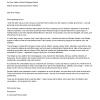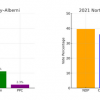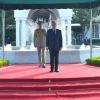Dear Mr President,
America is a fascinating society. It is a nation of nations: the world in miniature. Every continent, culture and civilisation is represented within your ranks.
In our unipolar world, non-alignment is no more the policy option of Third World countries who feared the collision or collusion of the two competing superpowers. Rather, it should be what characterises American foreign policy. Because if the US sides with one belligerent player in a regional conflict, not only does it unnecessarily alienate and antagonise all the other countries in the area but it also offends and ghettoises a domestic component of its own national and social fabric. A recent poll showed that 66 per cent of the American public wanted the US to be a neutral in the Israeli-Palestinian conflict.
Mr President, on the lecturing circuit I was regularly interrogated about my feelings concerning your candidacy for the White House. My constant answer was: “As a foreign diplomat, I am expected to exercise self-restraint on domestic issues. But my wife believes that Barack Obama is reawakening American idealism and is the only candidate to reconcile America with itself and with the world.”
After very promising beginnings, especially the Cairo speech about opening a new chapter in American-Arab and American-Muslim relations, Netanyahu is known to have told his entourage on the eve of one of his visits to the US: “I am stronger than this man in Washington, DC.” In your repeated confrontation of wills, he has undeniably prevailed. Commentators would write that he has shot himself in the foot but, so far, that does not seem to have affected him.
Last week’s Israeli Knesset elections were an eye-opener. Netanyahu publicly and categorically rejected not only a Palestinian state but Palestinian voters. For him, we are a threat as both a nation and as individuals. The Palestinian and Arab side have been what I call “unreasonably reasonable” in their pursuit of a negotiated settlement. They no longer challenge Israel’s existence, they only question its expansion. Yet today one can’t help concluding that what is democratically acceptable to one side is totally unacceptable to the other. And maybe here resides the major flaw in the peace process as it was choreographed up until now. Too much was left for the local belligerents “to sort out”.
The Palestinian side negotiated at the mercy of an uncomfortable balance of power, the process remaining hostage to Israeli domestic politics. Israel was constantly inclined to dictate the ceiling of the possible and permissible. Israeli public opinion wanted a diplomatic outcome that would reflect Israeli intransigence, American alignment on Israel’s side, Russian decline, European abdication, Arab impotence and what they hoped to be Palestinian resignation.
The past 24 years of theoretical peacemaking were not years of Israeli territorial withdrawals but years where we witnessed the expansion of occupation via the growth of illegal settlements. The diplomatic impasse today is not due to an Arab rejection of Israel’s existence but precisely to Israel’s rejection of Arab acceptance of it. Specifically, Israel persists in its refusal to renounce the territorial acquisition it made in 1967.
Mr President, with the accumulated disenchantments of the past six years, allow me to share with you three observations which I believe might be useful in drafting the way forward:
First, you seem to be unaware of the shift in the centre of gravity within the American Jewish community. It increasingly perceives Israeli policies and practices as a source of embarrassment for a community of Americans grown accustomed to being at the forefront of civil and human rights. Relegated, because of its attachment to Israel, to defend the indefensible, that community feels very uncomfortable with choices made by Israel and would welcome a more assertive US approach.
Second, unlike your irritating predecessor, an unrepentant unilateralist, you are authentically and genuinely a multilateralist. Yet you have made insufficient use of your European and international partners as a counter to domestic pressures. Europe is an actor in search of a role. We in the Middle East have a role in search of an actor. It is in everybody’s interest to move away from the self-inflicted impotence of external actors.
Third – and so far, Mr President –you have not shown a courage to match the audacity of the American citizens who dared, against all odds and prejudices, to vote you into office. Not once but twice. Successive US administrations have said that a Palestinian state is in the American national interest; that America is committed to Israel’s existence but not to its expansion. The unresolved Palestinian problem is detrimental to US interests and is a major recruiting agent for extremist movements. Netanyahu stubbornly wishes to project the image of American-Israeli collusion to keep the US on a collision course with the Arab-Islamic world.
Mr President, I suspect you would be surprised by the massive support you would receive, domestically and internationally, if you were to link US aid to Israel with US advice. In short: if you were to reconcile American power and American principles. Responding to the Palestinian cry for freedom out of captivity and bondage is crucial for US credibility, respectability and – I dare say – lovability.
With a single telephone call in 1956, President Eisenhower had David Ben Gurion withdraw from the occupied Sinai – and during a Presidential election year. Compared to Ben Gurion, Netanyahu looks like a lamb.
We still have two more years. If the international will was to have primacy over the Israeli national whim, a territory that was occupied in 1967 in six days can also be evacuated in six days, so that the Israelis can rest on the seventh, and we can finally engage on the fascinating journey of state-building and economic recovery.
Can we really witness another Eisenhower moment? Yes, Mr President, I believe we can.
Respectfully yours,
Afif Emile Safieh
















